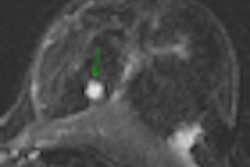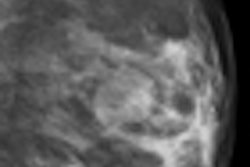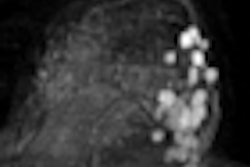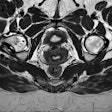VIENNA - Canadian researchers have found preoperative MRI scans can discover additional tumors in breast cancer patients without adversely delaying necessary surgery.
The study, presented Friday at the 2011 European Congress of Radiology (ECR), was conducted at the Gattuso Rapid Diagnostic Breast Center (RDBC) at Princess Margaret Hospital in Toronto.
Because previous research has suggested MRI has high sensitivity in breast imaging, the modality "is often used as a preoperative way to evaluate the extent of breast disease, and MRI can detect additional foci and tumors in the ipsilateral and contralateral breast," noted senior medical student Rebecca Zhu.
The information provided by MRI can lead to an effective treatment plan and care management for cancer patients. There is, however, the issue of waiting to receive an MRI exam; the wait time is approximately 13 days at the RDBC.
Length of delays
With that in mind, the purpose of the study was to assess the length of the delay due to MRI-induced workup in women awaiting surgery for breast cancer, and to examine MRI-induced workup outcomes. In addition, the researchers wanted to determine MRI's efficacy in detecting additional tumors.
"As a performance measure, we were particularly interested in the false-positive rate, in which case the patients may receive unnecessary surgery," Zhu said. "We also wanted to look at the surgical delay due to additional MRI-indicated workup."
In other words, if the MRI was interpreted as positive and additional tumor foci were detected, patients were invited to return to the clinic for an additional biopsy; the researchers also wanted to determine if there was a delay in surgery due to this action.
Patients are referred to the RDBC after a preliminary breast exam is suspicious -- either because of a suspected tumor or due to a positive mammogram. The clinic has a rapid tissue processing device, which allows for a histopathological diagnosis in approximately four hours. Depending on the results, the patient may see an oncologist to discuss treatment options.
Preoperative scans
"If patients do decide to go ahead with surgery, most patients will arrange to have a preoperative MRI," Zhu said. "If the MRI results are positive, the [patients] will be called back for an additional biopsy workup."
The study's population included patients who came to the RDBC between September 2006 and September 2008. The time frame was chosen because the clinic opened in 2006, and researchers wanted a follow-up of at least two years.
The study included patients with a malignant surgical diagnosis and a preoperative MRI. The researchers excluded patients with a benign preoperative diagnosis and patients who had received chemotherapy treatment. "It usually takes months for patients to complete chemotherapy, as well as the recovery time, so this [treatment] will prolong waiting time for surgery," Zhu added.
Patients in the study received a standard gadolinium-enhanced MRI scan on a 1.5-tesla system.
False positives
False-positive results were defined as any additional malignant tumor that was detected by the MRI exam and subsequent workups but not confirmed by surgical pathology results, which were used as the gold standard.
Over the two-year period, 292 RDBC patients were enrolled in the study. A total of 199 patients (68%) had surgery, with 174 (60%) patients diagnosed with malignant breast cancer after surgery. Of those 174 patients, 124 (71%) had a preoperative breast MRI and 34 (19%) received an MRI callback.
Additional foci of ipsilateral cancer were found in nine of the callback patients (26%), while contralateral cancer was discovered in three (9%) of the 34 cases. The false-positive rate of MRI-induced workup was 37.5%.
Diagnosis to surgery
The mean time interval from diagnosis to surgery for the nine patients who received an MRI scan and were recalled was approximately 51 days. For the 34 patients who had a positive MRI and were called back for further biopsy workup, the mean time interval from diagnosis to surgery was 57 days.
Zhu and her colleagues concluded the surgical delay caused by preoperative breast MRI and MRI-induced workup for breast cancer patients averaged six days and did not exceed nine days, which is "statistically insignificant and clinically acceptable for our patients."



















